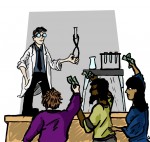Edward Miracco, a postdoctoral fellow at UCLA, is researching an enzyme that can be used in cancer prevention. But instead of being fully funded through federal or industry grants, part of his research is being supported by family, friends and colleagues.
Crowdfunding – a fast-growing, nation-wide option for researchers looking for money – allows individuals to donate small amounts of money to specific research projects. With federal sequester cuts negatively impacting UCLA research funding, researchers have had to look at alternative methods to finance their work.
A new website called UCLA Spark holds the potential to aids their efforts.
Although other crowdfunding websites, such as Indiegogo and Kickstarter, can be used to raise money for research, UCLA Spark, which launched last week, is the first UCLA-specific crowdfunding platform for professors and students looking to fund their projects.
The site can be an effective tool for both students and researchers, but an effort to widen the net of potential funders is an integral part of success, as in any crowdfunding initiative. Researchers and administrators need to make an effort to reach out to communities who benefit from specific research happenings at UCLA.
In turn, those communities should be receptive and, in fact, proactive about funding scholarship through this new platform.
One of the problems encountered by researchers using the website thus far is a difficulty in getting benefactors beyond their own personal networks of family and friends.
Though family and friends can play an important role in supporting researchers, it should not be the sole responsibility of those groups to shoulder the weight of groundbreaking research projects.
Miracco said he raised most of the money for his work in professor Juli Feigon’s biochemistry lab through donations from family and friends in amounts ranging from $10 to $1000; but Miracco’s project, which was a trial run of sorts for the website, can be a jumping-off point for future endeavors, and Miracco can improve upon his experience by reaching further to a targeted range of relevant donors.
With cancer research, for example, UCLA researchers and administrators can look for funds through networks affiliated with the UCLA Jonsson Comprehensive Cancer Center. This would broaden the financial responsibility to the greater UCLA community, not just the personal network of the individual professor or student running the project.
In an email, Jarrett Oakley, assistant director of UCLA Spark, said the crowdfunding website is working with various campus organizations to broaden the website’s engagement with other members of the UCLA community.
UCLA Spark is in an important stage of its development. With more focus put on the partnerships Oakley mentions, the program has the potential to succeed in connecting important research projects with prospective donors.
A desire for these partnerships was voiced by Ertugrul Taciroglu, a professor of civil and environmental engineering who is seeking funding through UCLA Spark to continue research toward the preservation of the Watts Tower, a National Historic Landmark. He said that he doesn’t know how he and other researchers can extend outreach beyond their own personal networks.
This is where a critical connection needs to be established: Researchers using UCLA Spark should have the ability to reach out to targeted audiences invested in the specific projects they are pursuing.
In turn, UCLA communities have the ability to spearhead efforts relevant to their interests. By getting involved with specific researchers, various UCLA stakeholder groups can promote projects important to them, forming a mutually beneficial relationship.
Furthermore, researchers can’t be expected to simultaneously carry out their experiments and act as their own lobbyists; by allowing researchers access to more specialized audiences, the time-consuming process of reaching out to family and friends via Facebook, spam emails and phone calls is cut out of the equation.
Oakleysaid UCLA Spark is currently in the process of working with UCLA Development staff to equip researchers with recommendations on outreach and other forms of support not provided by other crowdfunding sites like Indiegogo and Kickstarter.
With further promotion of targeted researcher-benefactor partnerships during the critical starting phase of UCLA Spark, crowdfunding has the opportunity to serve as a very helpful tool for promoting all types of research at UCLA. These partnerships are two-way streets though, as communities impacted need to respond to calls for funding.
Though crowdfunding has typically been associated with indie video games, startups and short films, UCLA Spark can extend this tool to produce life-saving research, but only if it gets projects into the minds of the people that can make change.
Email McCarthy at jmccarthy@media.ucla.edu. Send general comments to opinion@media.ucla.edu or tweet us @DBOpinion.
